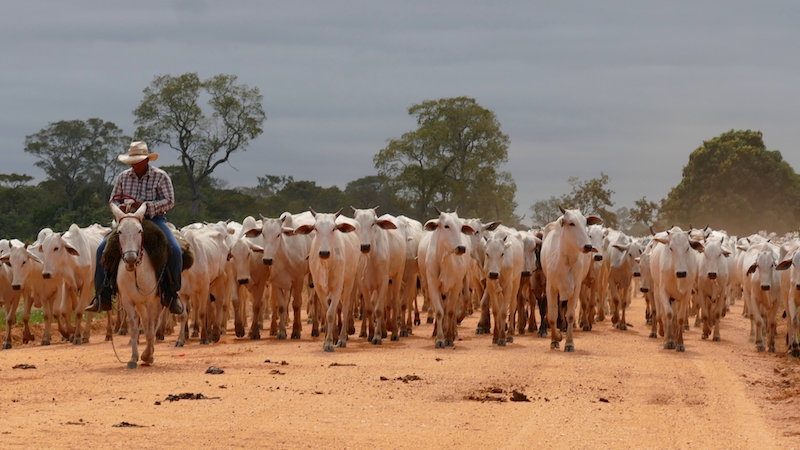Brazil’s new president Jair Bolsonaro arrives at the World Economic Forum in bullish mood.
His message is simple: I am the man to boost economic growth, cut corruption and attract new investors.
On Wednesday he gets his chance to address the world’s top CEOs in a 10-minute address, where we can expect him to double-down on his promises.
Yet as we have seen with president Donald Trump, claims of an easy path to sunny uplands are one thing. Delivery is quite another.
And while he has – for now – backtracked on his threat to ditch the Paris climate Agreement, the vast and precious Amazon rainforest faces new and potentially catastrophic threats from his deregulatory agenda.
We believe Bolsonaro must be judged on his actions, not rhetoric. Here are six unknowns that must be answered before we will know what course his presidency will take.
1 – The 2019 WEF risks report identifies extreme weather, failure of climate-change mitigation and adaptation, natural disasters as the key risks facing the world in 2019. As environmental risks crystallize with increasing frequency and severity, the impact on global value chains is likely to intensify, weakening overall resilience.
Given this will be a concern for businesses investing in countries, what is the plan for Brazil to become more resilient in the face of extreme weather? It warns that failing to address these issues is a material risk to business.
2 – Building on this theme, Brazil has been the stage of some of the world’s great environmental accidents. Take the 2015 Samarco dam collapse that killed 19 people and wrecked a river basin.
In late 2018 Anglo-Australian mining company BHP Billiton was taken to court in the UK for about £5bn by Brazilian victims. What we know from this event alone is that Brazil’s environmental regulations are too weak and poorly enforced, and that one outcome is a potentially ruinous fine for a major international corporation.
Will deregulating further going to make Brazil a better place for investors, who could face other brand-destroying events like this?
3 – Deforestation in Brazil has been rising again after a long period of reduction. According to the latest official data, almost 8,000km2 were deforested between 2017 and 2018. Illegal deforestation is usually associated with other criminal activities such as land grabbing, money laundering, illegal mining, drugs trade, among others.
Bolsonaro declared the fight against corruption and organized crime as key priorities of his mandate. In the Brazilian Amazon there are many claims of organized groups operating to invade public land, deforest a large area and illegally sell the land for illegal mining. Will he choose to combat these crimes? How?
4 – Economic stability was Bolsonaro’s key promise. There are over 27 million people unemployed or underemployed in Brazil. A key factor for stability is a reform in social security and pensions system, yet it seems evident after only a few weeks in power he lacks support across Congress and his military backers for radical change here.
Bolsonaro does not hold the majority of the 513 deputies of the lower chamber. Some 112 deputies have pledged loyalty to him while the opposition could have around 150 loyal names. To reform social security system demands approval from at least 308 deputies.
The same applies for tax reform, the second most important reform to improve the fiscal balance and a frequent theme in Paulo Guedes speeches after the inauguration, when members of the government expressed different opinions, that has been put aside for a later moment. Given these factors, how will he deliver on his flagship promise?
5 – The EU has already warned Brazil over future trade relations if it weakens its climate regime at home. This leaves Bolsonaro with a choice: does he accept Brussels’ stance, or does he pivot to the US?
Bilateral ties with the United States are the centrepiece of Brazil’s new foreign policy, but Bolsonaro needs to provide tangible evidence of how Washington will benefit from moving closer to Brazil.
Opening the U.S. to Brazilian products such as steel and soy would hurt Trump’s own electorate ahead of what promises to be an epic re-election campaign in 2020.
Even if Trump would like to help Bolsonaro, he is unlikely to overcome resistance in a house of representatives now dominated by Democrats – who have recently voiced their criticism of Brazil’s new president.
So what can Bolsonaro offer Washington DC that it does not have already? And will he be willing to harm trade ties with the EU?
6 – As the World Economic Forum has frequently flagged – fighting social inequality is key for a more stable economy all over the world.
Brazil ranks 9th in the global ranking for income inequality in 2017. The number of people living below poverty line in Brazil reached 15 million in 2017, or 7.2% of the population – up 11% from 2016’s 13.3 million.
Yet Bolsonaro omitted any mention to social inequality in his inauguration speech or during the electoral campaign. What are Brazil’s plans to lift millions out of poverty?
Ana Toni is executive director at Brazilian think tank Instituto Clima e Sociedade. Alice Amorim is Instituto Clima e Sociedade’s climate policy coordinator.
